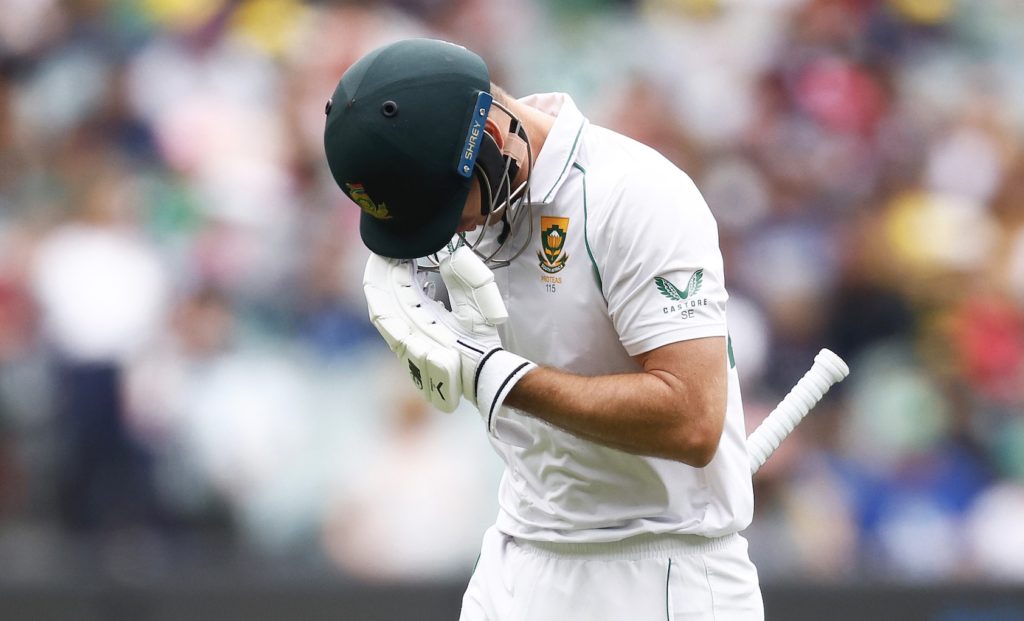There is no short-term solution for the Proteas in a Test context. It will get worse before it improves, writes RYAN VREDE.
When the Proteas beat India in South Africa early last year, and then drew away to World Test Championship holders New Zealand, they established themselves as a Test force.
They rose to second in the WTC standings and entered the series against England, a side in a rebuilding phase of their development, fancied by many who follow the game closely. An innings-and-12-run victory in the first Test of that series gave credibility to that belief.
Then it all fell apart.
In the five Tests since then, the Proteas have only twice made it past day three but were weather-assisted on both of those occasions.
Their batting has been at the heart of this spiral.
Since the second Test of the England series, they went seven Tests without scoring over 200, until they snapped that run in the second innings of the second Test, against Australia in Melbourne, where they were rolled for just 204.
Their batters have scored just six centuries in 22 Tests since the start of 2020, the fewest among the WTC teams. They are incapable of building match-defining partnerships, having had just nine century stands in the past two years.
Even the most experienced batters look utterly lost at the crease. To a man, the top six have chronic technical deficiencies, evidenced by most of them getting out the same way with disheartening consistency.
A coaching intervention is an obvious remedy, although it appears the scope and depth of their struggle are beyond the competency of batting coach Justin Sammons.
Sammons attributed part of the struggle to a lack of experience, saying: “There’s no substitute for experience and you can only gain experience by playing. So the more games you play, the better you’re going to get, and the more lessons you’re going to learn.”
He was speaking in the context of how little first-class cricket Proteas batters are playing. There is some merit to this argument, but the bulk of his top six have extensive first-class experience.
A selection intervention has been pushed for, although this has layers of complexity that need to be unpacked within the framework of a permanent coach’s vision. The Test coach, who should be announced in the next fortnight, will have to decide whether he wants to employ a youth-centred approach, which could only yield results in a few years, or one that attempts to stop the bleeding by picking hardened first-class performers.
The quality of that decision rests almost entirely on the quality of the candidate making the decision, and in this regard, the list – which includes Shukri Conrad, Adrian Birrell, Rob Walter, and Richard Pybus – doesn’t inspire much confidence if you are looking for catalysts for a new dawn.
ALSO: Klusener out of contention to coach Proteas
Conrad appears to be the frontrunner for the Test post. However, his domestic record is average and speaks to a lack of vision, innovation and ambition from Cricket South Africa.
This leadership crisis is further compounded by Test skipper Dean Elgar’s form. He was appointed in 2021 from a small pool of poor-quality options. Elgar has done an adequate job, but he hasn’t exhibited the ability to manage the collective and individual dimensions of his role.
READ: Elgar keen to keep captaining Proteas
Elgar, however, was always going to be a short-term fix while CSA waited for a special young thing to emerge. There was great hope that Aiden Markram would be that man, but his technical and mental deficiencies in Test cricket were brutally exposed in 2022.
Markram may yet recover and display a Hashim Amla-like second coming in Test cricket. CSA will be petitioning the cricket gods for this, because beyond him there are painfully few younger candidates worth consideration.
Temba Bavuma has been floated, but this shouldn’t even be considered. He has been crushed under the weight of the white-ball captaincy. Handing him the Test job would be an act of impossible stupidity and wilful sabotage.
My pick would be Keshav Maharaj. He is a consistent performer, and an astute tactician, as evidenced by his leadership in white-ball cricket in Bavuma’s absence. He also commands respect from teammates and the opposition alike.
Whatever route CSA takes, this leadership vacuum needs to be filled as a matter of urgency. It is the foundation on which the Proteas’ recovery from their current shambolic state will be built.
There are myriad other issues that directly impact the Proteas’ plight, among those what is increasingly becoming the poor standard of domestic four-day cricket and how that inadequately prepares graduates to Test cricket, as well as CSA’s mediocre and debilitating leadership.
READ: SA first-class cricket ‘very weak’ – Harris
By way of support to the latter point, last November, CSA promised a comprehensive report on the Proteas’ T20 World Cup campaign, which ended in defeat to the Netherlands. There is still no sign of that, nor any correspondence to update the media and public on its status.
My sense is that a system needs to be rebuilt, not a Test team. This will take time and exceptional leadership.
Things will get worse before they get better.







